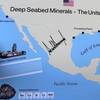Tripoli government invited Italy into its waters; some 600,000 boat migrants have come to Italy since 2014.
Italy intends to deploy several ships in Libyan waters by the end of August to fight human trafficking and stem a flood of immigrants, a government source said on Thursday.
A mission plan should be brought to the Cabinet for approval on Friday, and the necessary parliamentary vote to endorse it may be held next week, the source said.
"The exact number of ships and sailors is still being worked out," said the source. If parliament approves, the mission might begin "by the end of August", he said.
Prime Minister Paolo Gentiloni met with military chiefs and ministers on Thursday to discuss "security, immigration and the Libyan situation", according to a statement.
The mission "is a possible turning point", Gentiloni told reporters after the meeting. Details of the plan will be presented to parliament on Tuesday, he said.
In a letter sent on Sunday that Gentiloni outlined on Wednesday, Libya's U.N.-backed government in Tripoli invited Italian warships into its territorial waters. On Thursday, Gentiloni said he had spoken to several European "colleagues" who support the mission.
"It pleases me to know there is a lot of support in Europe to this new possibility," he said.
Tripoli had refused access to its waters to the European Union's anti-trafficking sea mission Sophia since 2015, hobbling efforts to stop smugglers.
As a result, some 600,000 migrants have reached Italy by sea from North Africa since 2014, making immigration a potent political issue and putting the country under increasing pressure to manage the new arrivals.
Most of the migrant boats left from Libya, where people smugglers operate with impunity amid the turmoil that has gripped the country since Muammar Gaddafi was overthrown in 2011.
COMMAND SHIP
A command ship heading a flotilla of at least five smaller vessels and up to 1,000 sailors will be used in the mission, newspaper Corriere della Sera reported on Thursday. Planes, helicopters and drones will also be used, it said.
The rules of engagement, the area of coastline to be patrolled and the nature of cooperation with Libya's security forces have yet to be defined, the source said.
One thing that is clear: Italy wants migrants who are picked up by its ships - should the Libyan coastguard not be able to intervene directly - to be returned to Libya and not taken to Italy.
"This all makes sense only if we can limit the arrival of migrants in Italy," the source said.
Migrants who reach international waters are brought to Italy because Libya is not considered a safe place for refugees, and returning them there would be a violation of international non-refoulement law .
Because the Libyan coastguard returns migrants to detention centres where they are held indefinitely in "inhuman" conditions, according to the United Nations, Italy wants U.N. agencies to bolster their presence there and to operate migrant camps that respect human rights, the source said.
Reporting by Steve Scherer











